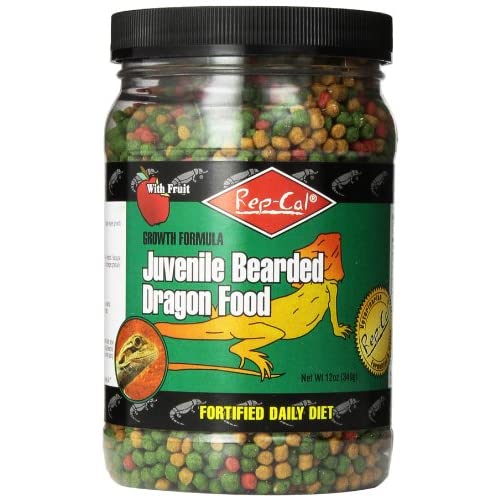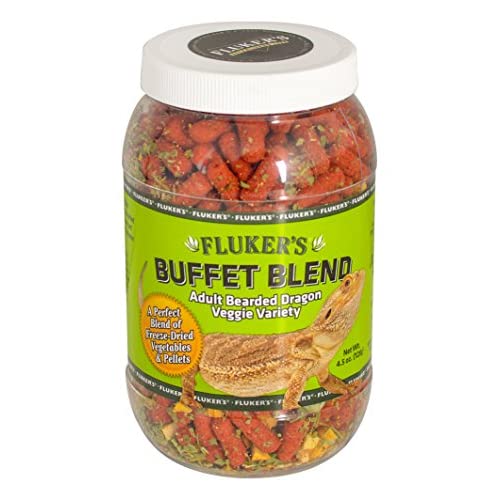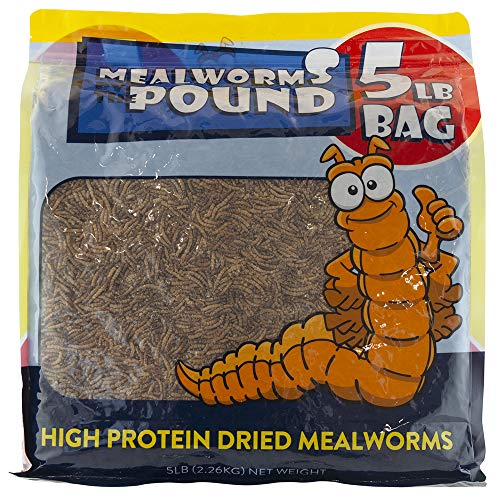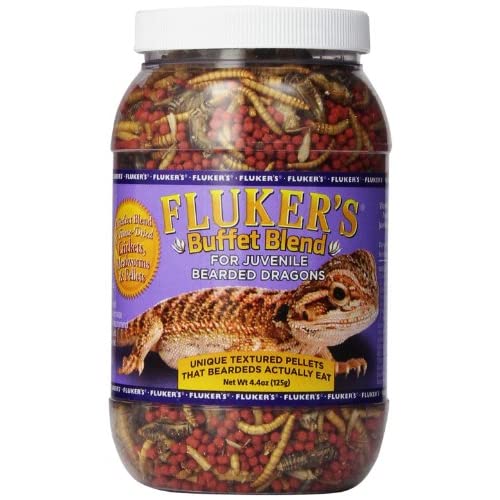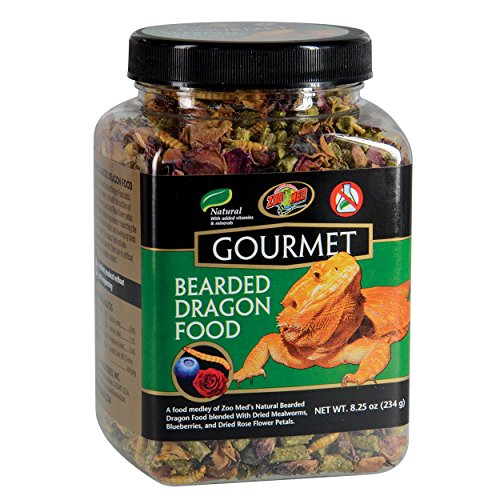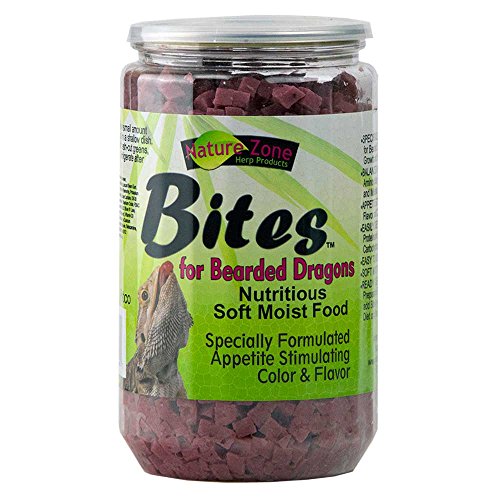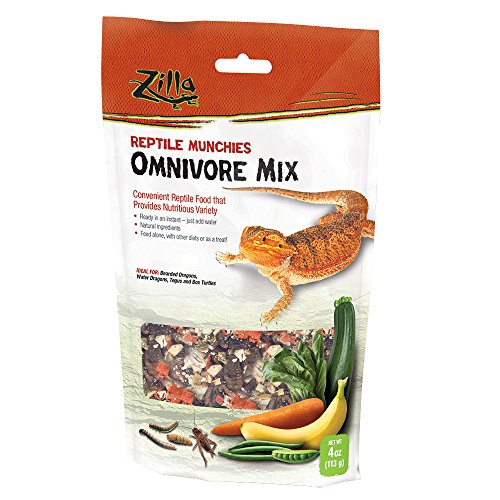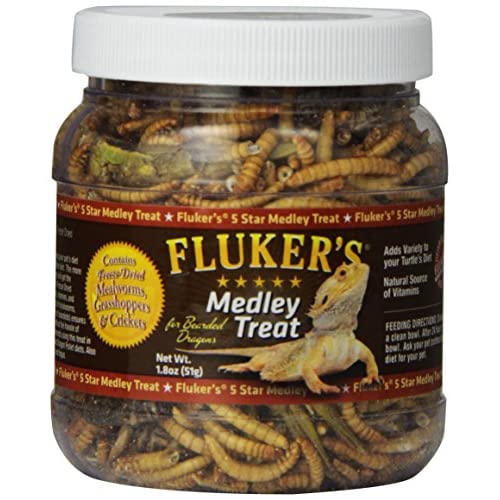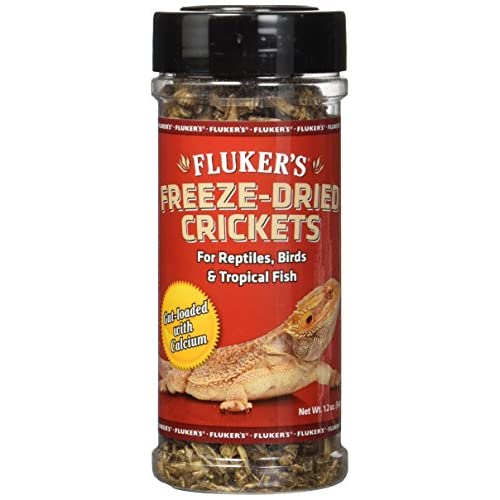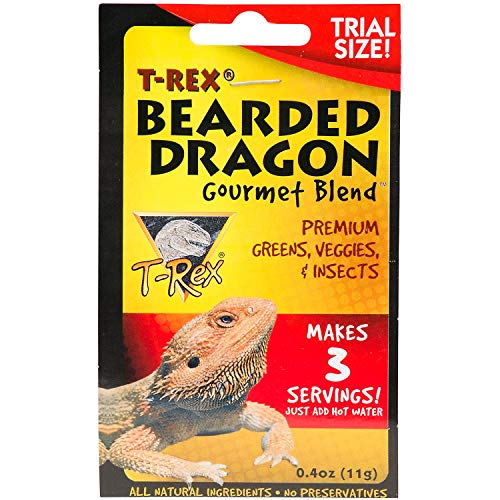Bearded dragons are medium-sized lizards that also offer the best foods to maintain their health and development. Not only should you feed them wholesome foods, but you should also vary the meal as often as possible because they are one of the living creatures like us and can eat a range of foods.
From sweet tropical fruits, green vegetables and their all-time favorite – worms and crickets, bearded dragons need to be fed additional supplements such as vitamin D, Calcium… to grow strongly and develop vastly as what their owners (you) hope.
You might be wondering which of the foods you should give them and what should not, in this article, I will answer for you in the most specific and accurate way.
Read this carefully and please let me know what is missing or confusing and I will probably fix this as soon as possible. Thank you!
Top 10 Foods for Bearded Dragons on Amazon 2021
#1 Rep-Cal SPR00813 Juvenile Bearded Dragon Food
Rep-Cal is fortified with optimal levels of protein, fiber, minerals, vitamins and minerals ( calcium and vitamin D3 can be listed) so you do not need to add any food supplements in their meal. Juvenile beardies will absolutely love this tasty food packed in a 12-ounce box. Be sure to moisten it by soaking in a bowl of water or fruit juice to soften it because the food size is quite large for a baby beardy. Once food becomes soft, you should drain the excess water and directly feed or mix with fresh veggies to your pet reptiles.
#2 Fluker’s 76042 Buffet Blend Adult Bearded Dragon Veggie Variety Diet
This is a must-have item in your bearded dragon’s diet even if you combine it with freeze-dried crickets and mealworms, it tastes more delicious for your beardie than you think. This Fluker veggie diet provides a range of vitamins and minerals to help your pet grow fast but strong.
#3 MBTP Bulk Dried Mealworms
This dried mealworms brand is complimented so much on Amazon in 2021 till now. It is 100% non-GMO (non genetically modified organism food) and doesn’t contain any additives, preservatives or fillers. The worms are large, fresh, and plentiful that are raised 100% on a vegetarian diet than most of the dried mealworms in the market.
As we know, mealworms content contains up to 51% of Protein, 23% of Crude Fat, 8% of Fiber and 8% of Moisture so they can provide a very nutritional diet with a high protein boost. Not only bearded dragons love this, but many pets also approved such as chicken, duck, wild bird… even their owners love them too and decide to rebuy next time
#4 Fluker’s 76051 Buffet Blend Juvenile Bearded Dragon
This buffet blend food includes nutritional crickets, pellets and mealworms. Juvenile beardies would definitely consider it as the ideal mixture for meeting their dietary needs. It has tons of ingredients like freeze-dried mealworms, freeze-dried crickets, chicken meal… to provide protein and many other things like corn to supply fiber. No need to moisten this buffet blend because it’s quite soft and easy to eat for the juvenile.
#5 Zoo Med 103 Gourmet Bearded Dragon Food
Zoo Med 103 is the new gourmet bearded dragon food that is added enrichment of blueberries, mealworms and dried rose petals to your pet reptile’s diet. It includes essential vitamins and minerals with no artificial colors, flavors or preservatives so you can totally believe it’s high quality.
The mealworms are quite large and pretty fresh and the fruits/veggies still remain the vibrant color after the freeze-dried process.
You should add a bit of water and soften it up, it would turn the best for your bearded dragon’s taste.
#6 Nature Zone Bearded Dragon Bites Reptile Food
Nature Zone is soft, moist and ready-to-eat food so you do not need to pre-soak or pre-prepare at all. It’s called bites because it’s all cut into bite-sized ¼ inch cubes to eat more conveniently, even for the baby bearded dragons.
This product is specifically formulated for bearded dragons to easily digest with over 50 amino acids, isolated proteins from whey & soy, soluble carbohydrates, vitamins, minerals and calcium also in each bite.
It has the wine color and prickly pear cactus flavor and scent to attract the beardies. This makes Nature Zone smell great and your beardie would probably not refuse to eat.
#7 Zilla Reptile Munchies For Pets
Zilla Reptile Munchies contains nutritious and dehydrated ingredients (green beans, peas, bananas,…) that are very quick and convenient to serve your bearded dragons with no refrigeration required. You can plate them alone in a bowl or dish or adding leafy greens, pellets as a treat.
Zilla Reptile’s content has up to 17% of Crude Protein and 6% of Crude Fiber and 2% of Calcium that are essential for the proper health of your bearded dragon. Remember to rehydrate them in water before feeding your beardie.
#8 Fluker Labs SFK72021 Bearded Dragon Medley Treat Food
Fluker Labs is a perfect medley blend of freeze-dried mealworms, grasshoppers and crickets. If your bearded dragon is not a live food lover, try these to enhance his diet, he will accept and love them immediately.
No need to deal with live prey items or live insects, just soak them in warm or hot water to moisten and rehydrate. Mixing with superworms or mealworms could also be a good idea if your beardie is quite picky.
#9 Fluker’s Freeze-Dried Crickets
Freeze-dried crickets from Fluker is a great alternative to live insects for many kinds of reptiles, tropical fish, birds and so do your bearded dragons. They are already pre-loaded with crude protein not less than 50.1%.
You will not have to deal with the smell of live crickets or you can save yourself the hassle of running to the pet store and finding that whether there is out of crickets, escaped or died crickets or not.
Spraying them with water and then feed your bearded dragons, they will definitely remain healthy ever after.
#10 T-Rex Bearded Dragon Gourmet Food Blend
T-Rex food blend for bearded dragons includes all-natural ingredients: sweet potato, carrots, red bell pepper, dried mealworms and a variety of veggies that are dehydrated in a state-of-the-art-process to preserve the originally fresh tastes and aromas.
As a result of mixing a variety of vegetables, this could help to improve your bearded dragon’s digestion and health. Any beardie would fall in love with T-Rex gourmet food blend because they can eat the freeze-dried premium greens, veggies and insects with the very fresh tastes.
Can Bearded Dragons Eat Apples?
YES, bearded dragons can absolutely eat apple on a regular basis as long as it is taken the skin off and cut into bite sizes.
Apples are a very nutritious fruit that rich in dietary fiber and quite free of cholesterol. Remember to not overfeed apples for under-twelve-month old bearded dragons due to their special diet: 70% protein and only 30% salad(veggies, beans, greens…). This ratio means they need more protein to grow rapidly than any remaining time of their life.
Can Bearded Dragons Eat Arugula?
Bearded dragons can eat baby arugula not the mature one. The question is why?
Baby arugula is harvested young for its more delicate, smaller and flavorful leaves. If compared to the mature arugula, it doesn’t have the intense flavor as the mature but still has some of the peppery essences.
I recommend that you only feed them with arugula on an occasional basis. It should not be considered a staple diet food because it is not good for your beardie’s health. Arugula will make it difficult for which are hard to digest the vegetable properly. However, it contains a high level of calcium so it could be very helpful for strengthening the bearded dragons’ bone structure.
It is wise to chop up the arugula before serving so your beardie will prevent from choking.
Can Bearded Dragons Eat Banana?
Absolutely YES, your bearded dragons can eat a banana; however, you should only give them banana once or twice a month. And every time you feed your beardie, remember to not feed him more than 100 grams (3.5 ounces) at once.
Bananas have a high level of phosphorus which binds with calcium and could lead to metabolic bone disease. Too much phosphorus in bananas (over 100 grams/times) will cause the situation of calcium-deficient then weakening their bones and their health.
Can Bearded Dragons Eat Bell Peppers?
The answer is YES, bearded dragons can eat bell peppers. Bell or sweet peppers are the good occasional element of their diet, although not all beardies love them.
Bell peppers have sweet taste rather than the hot one so this makes them different from hot peppers. They display a simple-recessive feature that prevents capsaicin – the chemical that gives most peppers their heat, from producing. As well as, they provide your lizards lots of water and vitamins C, E, K, B6… which are great for their health.
Red peppers might be preferred to green, orange or yellow peppers. You should cut them into very small pieces after washing it with water and then stripping away the seeds to serve your bearded dragons.
Can Bearded Dragons Eat Blackberry?
YES, blackberry is the one food that you can feed your bearded dragons without any fear of poisoning or health affection on a regular basis because they are proved to be very good for not only bearded dragons but humans also.
Blackberry contains a high level of fibers, antioxidants and lots of vitamin C, K, A that is good for heart and blood pressure, bone strength, diabetes management and the cerebral functions of a bearded dragon. In fact, when your beardie gets wounded, you should feed him some blackberries, since this fruit can prevent wounds from festering. I bet it will recover soon.
Serving blackberries in small portions to avoid the possibility of choking will be wise.
Can Bearded Dragons Eat Cantaloupe?
YES, but cantaloupe is not good food for bearded dragons to eat so they can be served as an occasional treat. Cantaloupe melon is very sweet, with orange flesh, it means this fruit is high in sugars and water content as well as vitamin A and C. It doesn’t have much calcium but contains a fair amount of potassium. The excess potassium in their diet can reduce their uptake process of calcium and lead to metabolic bone disease.
Unless you bearded dragons are overweight or unhealthy, you should feed them a small piece or two pieces a week. Every time you feed, chop them so their juvenile bearded dragons will not choke.
Can Bearded Dragons Eat Cheese?
The answer I’ll give you is NO because your pet reptile doesn’t have possibility to digest this kind of food.
There are 2 different parts of cheese: fat part and protein one. Each type of cheese will have a different ratio. Although this ratio changes slightly or sharply, there is a very high level of calcium which could potentially enhance their bone structure. However, the calcium consumption of a bearded dragon is lower than the amount of calcium in cheese so please consider carefully before feeding your beardies. And an important thing for you to know is that cheese is a dairy product that requires a strong digestive system to consume and absorb. If serving cheese in a long time, the risk of making your bearded dragon vulnerable to stomach problems or kidney failure and even obesity will become higher. Keeping your beardies stay away from cheese will be a great idea.
Can Bearded Dragons Eat Chicken?
Chicken is one of the most popular food across the globe so you will find it easy to purchase it in any shop. But you SHOULD NOT feed your pet reptile chicken. Why?
After searching for some information, I summarise that chicken contains a lot of fat and high protein levels (21% of total fat, 54% of protein), this means chicken is the best choice for an active body with many physical activities. However, your bearded dragon has a very different metabolism and seems not to be highly active, so he will find it difficult to digest.
Moreover, the ratio of calcium to phosphorus is not good for the beardies, calcium level does not outweigh phosphorus (1:16.7), it might weaken their bones.
Can Bearded Dragons Eat Eggs?
In general, bearded dragons can be fed small quantities of eggs. You should not consider them as a staple food for beardies, offer only once or two weeks or even less will be better. Using eggs from grass-fed/free-range chickens might be the great idea.
Depending on your beardie’s size and the egg’s size, you can offer as a small quail egg or half of an egg. Because eggs have a high level of protein, it might be better for feeding juvenile beardies, not the adult (the baby needs more proteins to grow)
Do not mix the egg with any milk or dairy product since your bearded dragon can be lactose intolerant.
The best way to serve eggs is to cook it till reaching the hard-boiled level, it would not make any digestive difficulties for your dragon consumption.
Can Bearded Dragons Eat Moths?
Moths are one kind of wild insects so it is very unsafe for feeding a bearded dragon. So the answer will definitely be NO.
As a type of insect, they might contain a fair amount of protein content that will be necessary for bearded dragons. More than that, the calcium level inside them will provide your beardie with a decent amount of calcium and strengthen their bones.
Sounds pretty good, huh? Read to this, you may think your beardie can eat moths. But there are several issues you should concern.
Wild insects like moths can bring many diseases or parasites from nature that could be harmful to them, you should avoid it at all costs. If you don’t want your pet reptile to be poisoned or tormented, skip the idea of feeding them moths right now.
Can Bearded Dragons Eat Grass?
There are many reasons why you SHOULD NOT FEED your beardies grass.
As we may know, grass is never considered as a nutritional food. However, you might see lots of animals still eat grass because they have a large body with strong metabolism so they can extract protein and carbs. For a reptile as bearded dragons, grass is not suitable for a small metabolism, it can lead to difficult digestion.
As well as, there is a very high phosphorus level to calcium ratio in grass, your bearded dragon will find it not healthy for his bone structure.
All the above explanations are answering the question of why you should keep your pet reptile away from this type of plant – grass.
Can Bearded Dragons Eat Kiwi?
YES, all kinds of bearded dragons can eat kiwi but occasionally. Kiwi is very rich in vitamin C and vitamin K, which is intensely great for the immune system of any living creatures. However, it also contains a large amount of acid and the digestive system of beardie is not built to withstand the effect of the destructive consequence of acid so you should feed your bearded dragon kiwi on an occasional basis.
Furthermore, kiwi also has quite good calcium to phosphorous ratio so it’s safe for them.
It would be smart to divide the fruits into small portions after peeling off the skin to avoid any digestive problems. Mixing it with other food is also a good choice to feed the beardies.
Can Bearded Dragons Eat Mango?
YES, but mango is a sweet fruit that only is fed as a treat, maybe once a week or less to prevent obesity and other issues.
Mango has a high level of vitamin C and folate, but more important thing is its large amount of acid. Much acid can cause difficulty for the bearded dragons’ digestive system.
Besides the fact that mango is quite hard to consume, it also has an unbalanced ratio of phosphorous and calcium which can cause metabolic bone disease in lizards. Containing much sugar is also the reason why your bearded dragon should eat it rarely.
The best way to serve is to chop them into pieces not wider than the beardie’s eYES to make it safer and easier to eat.
Can Bearded Dragons Eat Grapes?
Bearded dragons can absolutely consume grapes but not on a regular basis. Grapes are high in fiber which is a good element for their diet but also contains high level of sugar and oxalates causing negative effects on digestion to your dragon. One more negative fact is it’s phosphorus to calcium ratio is quite high.
Nevertheless, grapes still have a lot of vitamins like K, C, E and other minerals as well, it could bring some health benefits for your beardie.
Red grapes could be a better choice rather than green ones because it has a lower level of acid than that of green. They should only eat the seedless grapes to avoid choking.
Can Bearded Dragons Eat Mushrooms?
Bearded dragons SHOULD NOT EAT mushrooms is my answer. Mushrooms are used to boost the immune system and metabolism that could mean a lot to the bearded dragon’s health. However, we cannot ignore the fact that its disproportionate ratio of phosphorus and calcium would make it hard to digest food. The beardie’s digest system is not ready for mushroom, honestly.
As we know, there are several types of mushrooms with an attractive look but identified as poisonous to dragons. Although for edible ones, they are very rich in Vitamin B2, B3 and phosphorus – which are rare in other reptile foods, you should consider that it would be better to leave mushrooms out of the beardie’s diet.
Can Bearded Dragons Eat Pears?
The response is YES, you can feed your bearded dragons pears as long as you cut them into pieces no wider than their eyes. Pears should be given only as a treat – not the main part of their meal.
If your beardie is a baby, carefully consider to feed him since he may have a harder time chewing and digesting than the adult.
This type of food has quite a high level of oxalates so too many pears per time will cause calcium deficiency, which leads to metabolic bone disease.
The sugar content of pears is one of the reasons you should refuse to list them on your dragon’s diet. Once every one or two weeks is the good frequency to feed beardies pears.
Can Bearded Dragons Eat Potatoes?
You SHOULD AVOID FEEDING your bearded dragon potatoes in general but you can still take them as an occasional treat, especially sweet potatoes.
Potatoes have a good amount of carbs and fiber, plus vitamin B6, potassium and manganese and an excellent source of vitamin C as well that vary depending on the type of potatoes and cooking methods.
Because containing lots of minerals, they can help with circulation and maintaining blood pressure. However, the excessive ratio of calcium and phosphorus is not good so it is better to feed bearded dragons with potatoes more careful.
Note that once your potato turns green and sprouting, it can be toxic and poisoned, you should throw it right away. If you still want to serve it to your beardie, choose the fresh ones and cut it up small.
Can Bearded Dragons Eat Pumpkin?
YES, you can feed your bearded dragon pumpkin though in a careful way. Please do not give them too much. The low calcium to phosphorus ratio of 1:2 means it is not a good idea, but still fine in moderation.
Pumpkin is high in vitamin level and low in calories level. As a result, the immune system and health of bearded dragons will get lots of benefits from this food.
When serving pumpkin, you must remember to remove the seeds from the core. The skin should be removed too. If you forget to do that, this can actually cause an impaction for your beardies. When the seeds and skin are not digestible, your beardie might feel very painful.
More than that, due to the high water content of pumpkin, the beardies could get runny feces after eating. You should be prepared for this before you feed them.
Can Bearded Dragons Eat Raspberries?
YES, you should give raspberries occasionally. Raspberries are very rich in vitamin C and K so it can detox the bearded dragon’s body. Negatively, its moderate level of oxalates makes it is not suitable for the beardies to consume foods. You should only feed raspberries as a treat to ensure your pet reptile’s health.
In summary, you can serve your pet this type of fruit, albeit in a moderation but it’s still the best advice to feed it in a very small quantity to prevent acid overload.
Can Bearded Dragons Eat Spinach?
YES, you can serve it to your beardies. Spinach is a type of vegetable that has a high level of insoluble fiber, 100 grams of spinach will contain up to 36 grams of carbs in the form of fiber. Fiber could support ease the digestive system and avoid constipation.
Along with the benefit, this nutritional veggie is quite high in oxalates and iron that would be problematic for your pet’s kidneys.
You’d better serve spinach as a kind of side dish or a food supplement to provide your pet some fiber but not always. Every 1 or 2 weeks is good. Each time serving, chopping a very small amount of spinach, your pet will consume with no after-effect.
Can Bearded Dragons Eat Stink Bugs?
It is NOT RECOMMENDED to feed stink bugs to bearded dragons. As a kind of insect, it contains lots of protein in its flesh. Plus, its hard chitin exoskeleton is also an excellent source of calcium for your pet reptile.
Nevertheless, stink bugs are considered to be highly pesticide-resistant and they can carry pesticides on their hard chitin exoskeleton, the rate that your beardies get toxic will higher than ever.
So absolutely NO, stay away from stink bugs is necessary in the long term.
Can Bearded Dragons Eat Watermelon?
YES, watermelon and other melons as well is safe to feed bearded dragons. Watermelon is quite rich in vitamins and other minerals which contribute a lot to the immune system of your beardie. Moreover, its content contains a high level of water so it helps to prevent dehydration, but too much watermelon can cause runny feces as the after-effect of pumpkin.
This fruit also has the disproportionate ratio of phosphorous to calcium, you should serve it with small portions to the beardies occasionally.
Conclusion
I hope you’ve found the information and answer you need to find initially when clicking to this page. Let me know if there is any piece of knowledge is making you confused, I will definitely give the most detailed and satisfying response to you as soon as possible!
